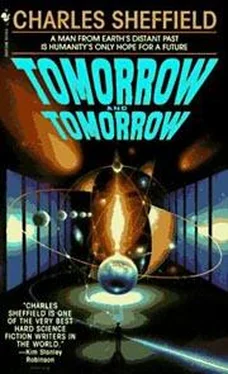Ana was coming back. She paused on the threshold, holding a tray of cups, coffeepot, cream and sugar. She smiled and arched an eyebrow. “You two all done? Safe for me to come back in now?”
Drake looked at her. She was thin and fragile, but she had never been more beautiful. Beautiful and brave and loving. At the idea of living without her his chest tightened. He felt as though he could not breathe.
Ana was his life, without her there was nothing. How could he ever bear to lose her?
“O! call back yesterday, bid time return.”
Tom was gone before ten o’clock. He could tell that Ana, who had been putting on her best front just for him, was exhausted.
Ana went off to bed as soon as Tom had left. Drake followed, half an hour later. She was already asleep. He lay down beside her without undressing, convinced that would be a waste of time. His mind was too active for any form of rest.
He closed his eyes. He imagined Ana, as she had been when they’d first met.
He always told people that he had loved her before he even saw her. The occasion of their first meeting was an end-of-term examination. Drake, as Doctor Bonvissuto’s star pupil in musical composition, had been taking a test alone, in a small room next to Bonvissuto’s austere office.
It was not the ideal setting for concentration, but Drake had been through the routine several times before. While he was setting down the parts of a fugal theme provided by his teacher, Bonvissuto was interviewing would-be choral scholars and students in the next room.
The test material was not inspiring work, and Drake could do it almost automatically, using sheets of lined score paper and a pencil. Bonvissuto scorned computers and all other aids to the rapid writing out of music.
“You think you need computer to write fast, eh?” He had scowled at Drake on their very first session together. “Handel, he write Messiah, every note, in twenny-four day. You do as good in two-three month, I don’t grumble. You want computer to help? Fine. Provided you write more and better. Better than Bach. Better than Monteverdi, better than Mozart. They had no computer.”
From Bonvissuto, that counted as mild comment. But he meant what he said. Drake slaved away at the test, without benefit of centuries of technological development, while in the next room a succession of young men and women came and went.
Most of them, Drake knew, arrived prepared to sing as Brunnhilde or Tristan or the Queen of the Night. Bonvissuto would have none of it.
“Something simple. Not the grand opera. The simple song, the folk song. You sing that real good, a cappella, then maybe we think about Verdi an’ Mozart an’ Wagner.”
They would sing unaccompanied, often off-key and loud. And Bonvissuto would comment, equally loudly.
“What key did you think you were in at the end there? And what language? Did you ever hear about diction? This song is in English, for Christ’s sake. Listening to you it could have been in Polish or Chinese or anything.”
Bonvissuto reversed the traditional pattern. When he was angry and excited, the Italian accent disappeared. In its place came perfect English and a Kansas twang. The same thing happened during his lessons with Drake, who had once been unwise enough to mention that fact. The teacher had winked at him and said, “Whoever heard of an Italian from Kansas? Whoever heard of a composer from Kansas?”
Drake finished writing out the fugue, turned the page, and went on to the final question. “Provide a suitable melody to go with the given accompaniment.”
He looked at what followed and realized that the question was going to be a snap. He knew the original piece. He was looking at the piano part of “Erstarrung,” the fourth song from the Winterreise song cycle. All he had to do was write out the vocal part. The accompaniment happened to be given in A-minor, up a tone from the version that he was most familiar with, so he would have to transpose; but that was trivial.
He read the question again to be sure. “ Provide a suitable melody.” It didn’t say, “ Compose a suitable melody of your own.” And he certainly could not improve on Schubert.
As he wrote in the vocal line he heard the door open again in the next room. There was a mutter of conversation, then a single chord, E major, on Bonvissuto’s piano.
A woman’s contralto voice began to sing, “Blow the wind southerly.” It was a strong, true voice, slightly husky in the lower register and with just a touch of an attractive vibrato on the high notes. Drake paused to listen. After the final note there was a pause, then again a single chord on the piano. It confirmed what Drake already knew. The woman had finished exactly on E natural, in the key where she had started. She had been right on pitch all the way through.
Drake heard another muttered sentence or two spoken in the next room, then the door opened and closed again. He waited, writing in the last few bars of the exercise. Surely Bonvissuto hadn’t sent her away, just like that, without talking to her some more. Drake wanted to hear her sing again.
On an impulse he collected his answer sheets, stacked them neatly, and walked across to the connecting door. He turned the doorknob and went through without knocking.
He braced himself. Anyone who entered Bonvissuto’s office uninvited could expect a hot welcome.
The expected blast did not come. Professor Bonvissuto was not there. Alone in the room, standing by the piano and staring at him uncertainly, was a slim, blond-haired girl.
He stared back. Her hair was cut a little lopsided. She wasn’t very tall, maybe five four, and her pale blue dress didn’t look quite right on her. Drake, no connoisseur of clothing, did not realize that it had been intended for someone a couple of inches taller. But the most striking thing about her, far more significant than clothes, was her age. She looked about fifteen. It was hard to believe that the mature contralto voice he had heard came from her.
“Are you next?” she said finally. “I thought I was the last one. He won’t be long.”
He realized that he had been staring, but so had she. She must assume he was there for a vocal audition. He thrust his sheaf of papers out toward her. “I’m not here to sing. I was taking an exam. I’m one of Professor Bonvissuto’s students. Was that you?”
“What me?”
“Singing. ‘Blow the wind southerly.’ ”
“Yes. Why?”
“It was good.” He wanted to add that it was wonderful, heart-stopping, soul-searing. Instead he said, “Where is he?”
“The professor? He went to register me. I didn’t think I’d be accepted, and it’s the last day to sign up. He said he could push it through.”
“He can. He knows how.” Drake, not knowing what to do next but reluctant to leave, sat down on the piano stool.
She asked from behind him, “Do you play?”
“Yes. Not very well.” He was convinced that he could feel her critical stare burning into the back of his head. Music was full of prodigies: tiny infants picking out chord sequences, concert performers under ten years old, composers who wrote great works in their teens. And here he was, over eighteen and still a student. He wanted to blurt out that he had started late, that his family had been too poor to think of music lessons, that he had come to music only when he found that, almost against his will, melodies arose in his head to go with poetry that he was reading.
He couldn’t say any of that. Instead, to hide his self-consciousness, and with “Erstarrung” still in his head, he began to play the restless, uneasy triplets of the song’s introduction.
Читать дальше












